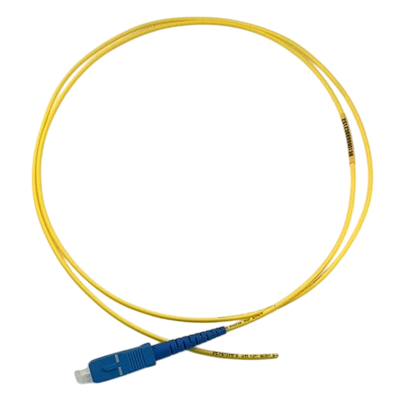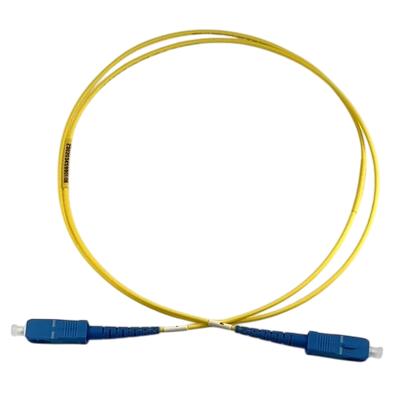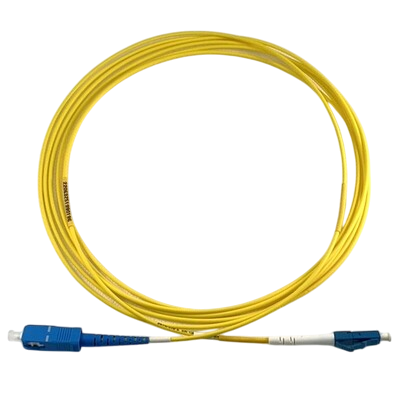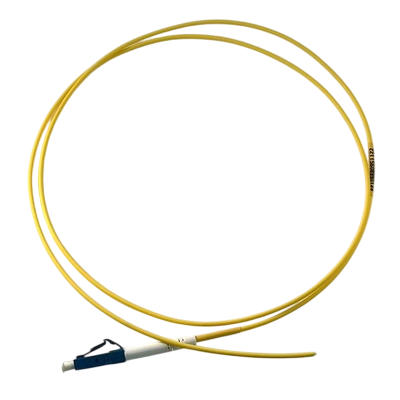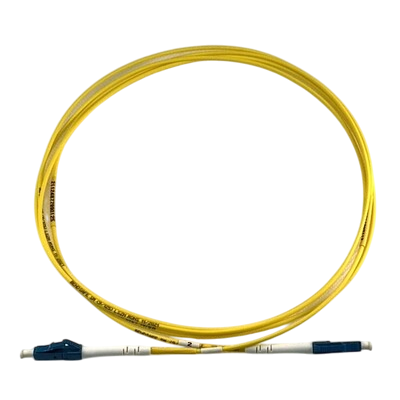What is a Fiber Optic Cables
A patch cord is a Fiber Optic Cables with fiber-optic connectors attached to one or both ends of the fiber-optic cables.
There are many product patterns to choose from.
Fiber Optic Connector Types "SC / LC"
Fiber Optic Cable Types "Nuber of Cores" and "Mode"
A description of each is provided later in the page.
Select by Connector Types
You can choose from optical connectors and SC / LC connectors.
*Please select a product from the image link.
Select by Cable Types
The type of Fiber Optic Cable will be selected from "Number of Cores" and "Mode".
*Please select a product from the links ”Click here”.
| SM Single mode |
OM2 Multi mode 1G |
OM3/OM4 Multi mode 10G |
|
| 1 Core | Click here | Click here | Click here |
| 2 Core | Click here | Click here | Click here |
| 4 Core | Click here | Click here | Click here |
Connectors (SC / LC) for the Fiber Optic Cables
Fiber Optic connectors are also called Fiber Optic Cable Connectors or Fiber Connectors.
You can select SC or LC connectors according to the equipment you are using.
■SC connectors
SC connectors are the most common optical connectors and are the worldwide standard for LANs.
■LC connectors
LC connectors are smaller than SC connectors and can be mounted more densely.
A patch cord with a Fiber Optic Connector at only one end is also called a Fiber Optic pigtail,
It is often used for fusion splicing instead of connector splicing.
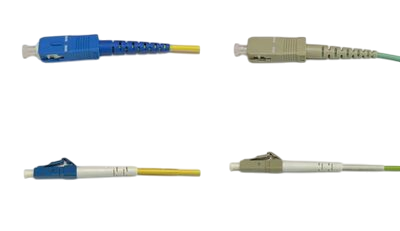
Trivia:Ferrule Polishing of SC and LC Connectors
- The ferrule polishing method of SC and LC connectors uses a spherical polished ferrule.
Reflection and connection loss are low and stable connection is possible. Furthermore, special polishing enables even lower reflection.
This product uses UPC (Ultra Physical Contact), a process with low attenuation.
*It is compatible with PC and SPC polishing.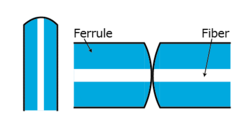
Number of Cores for the Fiber Optic Cables
1 Core
1 Core (single core) type is the most popular fiber optic patch cord.
1 core type, also known as simplex communication, uses a single fiber to transmit data in a single direction.
It is suitable for unidirectional communications such as traffic and packet transmission, and transmission to data centers and control rooms,
It provides inexpensive, high-speed communication.
Click here for specifications of 1 Core
2 Core
2 Core type is a type of fiber-optic cable with two fiber-optic cables put together and two connectors attached.
The two cables are put together to look like a pair of glasses, so they are also called "eyeglass cords".
The 2-conductor type, also known as Duplex communication, uses two fibers for bi-directional data transfer.
It is best suited for bidirectional communications, such as communications between servers, switching hubs, and data centers.
Click here for specifications of 2 Core

4 Core
4 Core type is a pigtail type with four connectors attached to one end.
It is called 4-conductor type because 4 fiber-optic cables are put together and 4 connectors are attached.
Fiber-optic fusion splicing is possible for each tape cord, enabling 4-fiber batch splicing,
This allows for batch splicing of four fiber optic cords, significantly shortening the splicing time.
Click here for specifications of 4 Core
Mode (single / multi) for the Fiber Optic Cables
Optical fiber consists of three layers (core/cladding/coating), and light passes through the core.
There are two types of optical fiber: single-mode and multimode. Single-mode has a small core (9μm) and multimode has a large core (50μm).
They are also denoted as 9/125/250μm, 50/125/250μm, etc. *The red line in the image shows the movement of light.
■Single mode
Single mode carries one optical signal at a time, resulting in high communication speeds and making it suitable for long-distance applications over 40 km.
Because of its high capacity and stable data transmission,
suitable for a wide range of long-haul, high-bandwidth network links such as CATV, campus backbones, telecommunications, and large enterprises.
Glass cores are much thinner than multimode.
■Multi mode
Multi mode can transmit more data in a shorter period of time, but is intended for shorter distances due to its higher dispersion and attenuation rates.
It has a slower transmission rate and shorter maximum distance, making it ideal for low-volume, short-distance applications such as general data and voice.
Easier to connect than single mode.
Multi-mode is available in three levels of lineup.
OM2 Multi-mode 1G
OM3 Multi-mode 10G
OM4 Multi-mode 10G+

Talk to our Experts

Our well experienced engineers would carefully look into your requests and respond with the finest proposal. No minimum quantity is set for the orders of customization. Please do not hesitate to contact and ask us anything.
Tel. +81-3-3939-9161
Office Hours
・EST (Eastern Standard Time): 20:00–04:00
・PST (Pacific Standard Time): 17:00–01:00
・CET (Central European Time): 02:00–10:00

